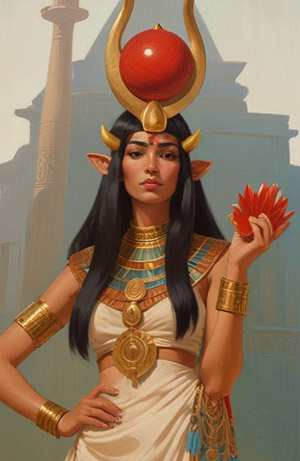The benevolent deity Hathor is part of the Pharaonic and Mulhorandi Pantheons. She is a deity of music and dance, art and inspiration. Her broad portfolio also includes influence over love and motherhood, the moon, and fate.
Hathor is known for her soft speech, which is like receiving comforting words following a raging argument, words that seem gentle because they dispel anger and sadness. Her laughter is like the joy of an infant, and all babies are precious to her. Hathor's very presence brightens her surroundings and brings peace and contentment to those in the shadow of her presence. Hathor never utters a harsh word, shows impatience, or loses her smile. She speaks earnestly and humbly except when performing one of her dances or a song, when she is wildly exuberant.
Hathor's clerics wear the white robes common to most Pharaonic/Mulhorandi clergy and shave their heads if they are male. In Egypt, Hathor's clerics are both male as female, while in Mulhorandi Hathor's clerics are mainly female.
The church of Hathor is loosely organized, eschewing the trappings of theocratic power common to Egypt/Mulhorand’s other temples. Hathor has no interest in politics, and few of her clerics seek temporal power - a rarity in Egypt/Mulhorand. Instead, her servants seek to nurse the sick, aid the poor, and protect all children. Clerics of Hathor wander Egypt/Mulhorand dispensing aid to the poor and downtrodden. They donate much of their money directly to those who need it most and many live solely on the charity of those they aid. Her clerics are often artists, proficient in the visual arts, dance, or music, or sometimes all three. They lead dancing rituals in Hathor's honor, create art-work to adorn her temples, seek to inspire others, and interpret dreams (which they believe are Hathor's inspiration).
Clerics of Hathor pray for their spells at whenever the moon is highest in the sky during the day or night. Clerics of Hathor follow a lunar calendar of 30-day months that does not include the standard special days of the Calendar of Harptos. They have a cycle of prayers corresponding to each day in a month that repeats with each full moon. On the day of the first full moon after Greengrass, the clergy of Hathor celebrates a holy day known as the Birthing. Clerics try to time their pregnancies so they may give birth near this holy day. All clerics of Hathor are required to unveil a new song, dance, or poem at this time, if they are not in the final stages of pregnancy or the mother of a newborn. Midsummer’s Eve is known as the Celebration of the Moon to clerics of the faith, who spend the day in joyous revelry and uplifting hymns. Her clerics sometimes multiclass as bards.
Hathor's temples are widespread in the lands where the Pharaonic/Mulhorandi deities are revered.
Egypt: Hathor's essential teaching commands people to savor life and all the good aspects of it—beauty, art, music, love, and family. Hathor's clerics teach that these things are divine gifts, meant to be enjoyed and protected. There is no evil in enjoying these simple blessings; it is evil to deny them to another or to destroy them.
Mulhorandi: Help all who turn to you for aid, be they slave or free, high born or low born, for all Mulhorand’s children are equal in Hathor’s eyes. Provide sustenance for the hungry, healing for the hurt, health for the diseased and protection for the endangered. Act humbly, for pride and haughty words come not from the heart of the Nurturing Mother. Treat those in your care as royalty, for so shall you be cared for in the peaceful garden of the Quiet One in the afterlife. Be joyful and spread happiness with your words and deeds. Dance and let your heart be light, for goodness and mercy shall be yours in this life and the next.
Hathor appears either as a human woman with the head of a cow, as a human woman with cow's ears or horns, or simply as a large cow.
Hathor is one of the daughters of Re-Horakhty and is married to Bes.



